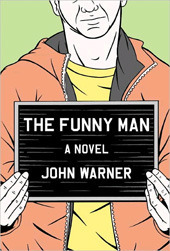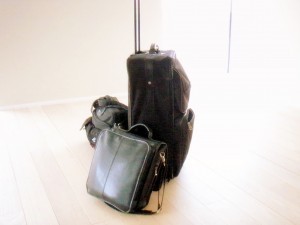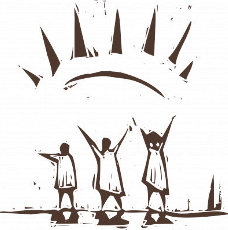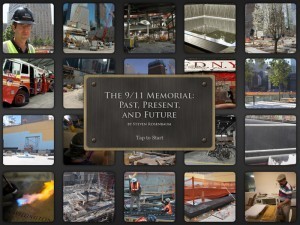Jane Friedman's Blog: Jane Friedman, page 205
September 19, 2011
When Mom Was My Age (#44)
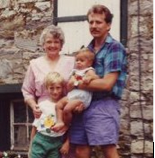
Barbara Ann Becker with son and grandsons, 1990
When Mom Was My Age is an interview series between daughters and mothers. New interviews appear on random Mondays. If you would like to participate, contact Jane.
The following interview is with Barbara Ann Hess Hershey Becker (age 84), reflecting on her life at age 63, interviewed by daughter Shirley Ann Hershey Showalter. Shirley has been a college professor and college president (Goshen College, 1997–2004). Now she blogs at 100memoirs.com, lives in Brooklyn, and writes her memoir from 6-8 a.m. "Farmer's hours," she calls them.
From Shirley
I'm very fortunate. Most friends my age can no longer call or visit their mothers. I talk to mine at least once a week. My mother is only 21 years older than I am and still active mentally and physically at age 84. She drives her red Taurus around town and to her children's homes. She enjoys reminiscing and has been helping me with material for the memoir I am writing, Rosy Cheeks: A Mennonite Childhood. We sat down at my sister's kitchen table as Hurricane Irene barreled up the East Coast and reconstructed some of the highlights of the year 1990—the year mother was 63.
Where were you living in 1990?
I lived in a very old farm house near Lititz, Pennsylvania. It was built about 1740 as a tavern on the toll road to the "western frontier" of Pennsylvania during the colonial era. The house was the home of five generations of my husband's ancestors—Snyders and Hersheys. It has the distinction of having been the place where the Moravian missionary Count Nicolaus Zinzendorf preached in 1742. A local farmer converted by Count Zinzendorf's stirring sermons gave the land that became the Moravian settlement of Lititz. A deed for that farm signed by the three sons of William Penn still hangs on my wall in the retirement community I live in now.
What was your work then?
Although I had been a widow for ten years in 1990, I still did a lot of work I had done as a farm wife—cooking, cleaning, gardening, and baking. I was active in the church and went to singles events with two of my friends who were also widows. I had weekly appointments with my prayer group and with my hairdresser. Four of my five children lived nearby (all of them except you!), and one of them, Sue, lived on a dairy farm. I would help with intensive day-long projects—canning and freezing corn, peaches, applesauce, Christmas cookies. We would spend all day working together and then divide up the fruits of our labors. Working together was fun. The last two of my 13 grandchildren were born in 1990 also, so I was busy even though I was retired.
I traveled to Winnipeg, Canada in 1990, and I also gave talks to many church groups along with my friend Earla. The name of the program was "Love Is Something Special." I spoke, and my friend played the piano. I guess you could say that was my work.
What did you worry about then?
I'm not a very good worrier, I guess. Or am I? I like to take each day as it comes and pray when I'm worried. Of course, the welfare of my children and grandchildren was always on my mind. I also thought about whether I would ever get married again. I might have had a few dates. Nothing exciting—those singles events were pretty pathetic. I didn't worry too much about money. I was blessed to have a good farmer renting my farm.
What did you think the future would hold?
With five children and thirteen grandchildren, I knew my future would always be tied to their joys, sorrows, interests, and accomplishments.
How do you look back on that age now?
I would call it a good time in my life. I was healthy and energetic. After ten years of widowhood, I lived alone but I wasn't usually lonely. I missed my husband deeply. I missed male companionship. I missed the identity of being part of a married couple. I used my gift of speaking in the church. I had a lot of love in my life.
From Shirley
Mother had 13 grandchildren at age 63, and I have one—Owen William. My husband and I are living in Brooklyn for a year to take care of Owen. Though Brooklyn and Lititz are worlds apart in many ways, the love of my mother for her children and grandchildren and great-grandchildren is a constant presence in our lives. I talk to mother on the phone every Sunday and try to visit her as often as possible.
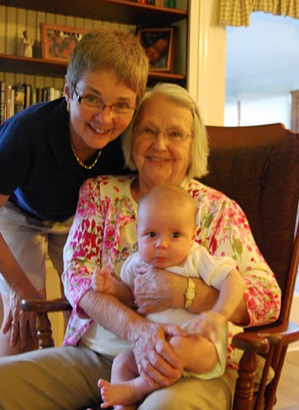
Shirley, Barbara Ann, and Owen (August 2011)

September 16, 2011
Using Word of Mouth (Not Media Attention) to Sell Books
I've known John Warner since my days as an acquisitions editor at F+W Media. He is among the most decent, classy, and talented authors I've ever had the pleasure of working with. I acquired and edited three of his humor books at F+W (though only two were published—long story), and we partnered on a short-lived humor imprint that deserved more attention than it received, like so many things in publishing.
John is an editor at McSweeney's Internet Tendency, and has a long career in writing and editing humor. This month, his debut novel, The Funny Man, releases from Soho Press.
I was curious about how things are going pre-launch, and he graciously agreed to this Q&A. If we're lucky, he'll be back next year with a post-mortem.
Let's read the tea leaves. You have solid reviews from Publishers Weekly and Booklist. The Daily Beast has named your novel one of the best debuts of the fall season. You recently wrote a beautiful essay for The Millions that ties into your novel. The Picky Girl has recommended you. You have blurbs from all the right folks (Brock Clarke!). Do you think this is sufficient word of mouth to sell the book?
I am and always will be eternally grateful for all of these things, the Daily Beast mention alone is more than most books get, and the Brock Clarke blurb makes me blush, and the Picky Girl made my week if not my month with her review, but by themselves, these are not even close to "enough" to sell the book in anything other than relatively paltry, "friends and family," numbers.
That said, I'm hopeful that all these little sparks have the potential to catch fire. I'm not expecting "call-the-forest-service-and-drop-in-the-smokejumpers" fire, but something like "Whoa! Now that's a fire!" fire would be nice and probably do enough to allow me to do another one, which is my goal. It's impossible to know what mention or connection will lead to some kind of tipping point, so every single last one of them counts.
At one point, the pre-order for the Kindle version of your book hit $2.69, probably due to a spike in pre-orders. The publisher's earnings, and thus your royalties, aren't harmed by this (Amazon is the one who loses money), but I wonder if it worries you. Many people think this sort of "dynamic pricing" can hurt the value of a book. Others think it's smart marketing. Thoughts?
I am very aware of the potential for low prices to harm the perceived "value" of a book, and it concerns me plenty. In a world where no books are priced more than 99 cents, a lot of people who do this professionally will no longer be able to do it professionally, and while I'm a big believer in the potential for digital technology to give voice to writers who fall outside the traditional publishing gatekeepers, I'm also worried about a world where fewer and fewer writers can make anything close to a living on their work.
On the other hand, looking at it from a reader's point of view, the $2.69 price seems about right for a pre-order for a digital copy of a book by a guy they've never heard of. The world is not beating down the door for copies of my book, so offering it at a reduced price to spur interest is something I'm ultimately comfortable with. It's like in the grocery store where the generics are two for one and you try it because it's such a good deal, and then realize that it really is just as good as the name brand. (Did I just compare my novel to generic food? I really do need help with the marketing.)
If I ever hit the level of someone like Tom Perrotta (whose new book, The Leftovers, is terrific), an established author with a great track record, I can expect to see my book priced higher. Right now, if the low price induces someone to take a chance on the book, that feels both good for me, and good ultimately for reading and books in general, but maybe I'm just trying to have it both ways.
You have a mini-tour of the East Coast planned. Word on the street is that author tours suck up a lot of time, energy and money for very little sales. Others say it's a great networking opportunity—that you can't expect to pull direct profit from it, but the long-term rewards are tremendous. What do you expect to get out of it?
Yes, yes, and yes to time, energy and money, I'm tired and I haven't even left yet. I have made the schedule as compact as possible to save time, and am crashing on couches to save money. For energy, I will mainline Red Bull.
I think the tour has the potential to build word of mouth and draw media attention and therefore drive sales, but none of those is my reason for doing readings and appearances. I'm primarily doing it because it's going to be fun.
In New York, I'll be reading with Teddy Wayne, Sarah Walker and Ben Greenman, people I've been editing on McSweeney's for years. I'll get to have lunch with my agent who I've never met in person, and drink beers with my editor who I've also never met in person.
In Boston, I get to read with fellow McSweeney's editor Chris Monks, a guy I've worked with for years, whose book I edited and whom I've also never met.
WriterHouse in Charlottesville invited me to come over a year ago, and I've been looking forward to it ever since.
Later on, I'll be reading at both my undergraduate and graduate alma maters where I'll reconnect with old friends and mentors and probably get a little weepy. If I sell books, it's gravy. This is mostly going to be a fun trip. Plus, it's partially tax deductible.
What other marketing and positioning strategies do you and your publisher have lined up? What do you have high hopes for and/or what do you have serious doubts about?
I'm not privy to every last plan, but I think there's going to be some ads on websites, lots of work at getting word of mouth going, that kind of thing.
One of the things that I'm hoping pays off is AuthorBuzz, which is largely invisible to the average reader, but I think is a great way of getting grassroots word of mouth going among the bookselling community.
For most books like mine, to sell "well," interest has to come from the ground up, rather than the top down, it's driven by readers rather than by media attention, and AuthorBuzz is the kind of thing that I'm hoping accomplishes that.
If any media attention does come from the book, it's going to be because some reader with those connections made it happen.
Of all the authors I know, I've always felt you had the most amazing platform and network of relationships, which you are very quiet about. Maybe it's modesty. And maybe it's the fact you're not very "noisy" on social media. Will that change now that you have a novel out? Are you lurking on GoodReads? Getting on Twitter? Amping up your presence on social media in any way? Are you seeing any impact so far?
I suppose I do have a pretty wide and deep network of friends and acquaintances related to writing and bookselling, but this list is something that's grown incrementally over the years, primarily through editing, rather than writing.
I may be a debut novelist, but I'm also not so young (41), and just by living, you pick up some connections along the way. Also, because I primarily work with these people as an editor, my role has always been to be of service to them (as "my" writers) rather than the other way around. It feels weird to try to flip that equation, and I never want them thinking that there's some kind of quid pro quo for my ongoing advocacy of their work. I work with and champion them because I think seeing more of their work in the world is a flat out good thing.
I haven't been noisy on social media because I come from a deep Midwestern mentality that you shouldn't be making noise unless it's purposeful and interesting, so it's not a comfortable process. That said, I've ramped up my Facebooking and I do have a Twitter feed, and I'm trying to use it for good. It's just not something I'm particularly fantastic at, or comfortable doing, even though I know it probably has benefits.
Most of my writer friends have been fantastic about spreading the word through every means possible, which doesn't surprise me in the least. They're good people.
You recently started a site/service called The Staff Recommends (TSR), which recommends books for people to read next. It's an interesting advertorial model, in that IF you and your staff discover a book and love it, then publishers can pay to have their book featured on your site. I wonder if this model was inspired by the fact you grew up in a family that owned a bookstore? How's it going so far? I'm sure publishers are curious to know what impact your coverage has.
The idea for The Staff Recommends was all Andrew Womack, of The Morning News, so I can't say I inspired it, but I can say that watching my mom recommend books for better than 20 years when she owned her store is something I think about often both with TSR and my Biblioracle work.
Before I was a writer, I was a reader, and the sensation that comes with really connecting with a book simply can't be duplicated by any other medium. It is true virtual reality, where your consciousness joins another in a deep and inexplicable way, and it is awesome. I started writing because I wanted to be able to do that from the other half of the equation, but to be able to hook other readers up with books is often just as good.
I think all the books that have been featured on TSR have seen tangible benefits to their sales, but like everything else, it's only one part of a much larger equation. I do it because it gives me a professional excuse to read (not that I need one).
 John Warner is the author of four books, including
Fondling Your Muse: Infallible Advice from a Published Author to the Writerly Aspirant
, acquired and edited by Jane Friedman before she sold out and became a professor of all things. He's editor at large of McSweeney's Internet Tendency and a one-man book recommending service known as The Biblioracle. He teaches at College of Charleston, and
The Funny Man
is his first, but hopefully not last, novel.
John Warner is the author of four books, including
Fondling Your Muse: Infallible Advice from a Published Author to the Writerly Aspirant
, acquired and edited by Jane Friedman before she sold out and became a professor of all things. He's editor at large of McSweeney's Internet Tendency and a one-man book recommending service known as The Biblioracle. He teaches at College of Charleston, and
The Funny Man
is his first, but hopefully not last, novel.
September 15, 2011
Writing on the Ether
The first time I flew into Heathrow, I was thrilled to hear everyone calling my name. "Porter! Porter!" Allow me to get your baggage this week.
A valise full of numbers
"In its one day on offer as (an Amazon) Daily Deal, Food, Inc. sold 14,158 ebook copies—an astounding number. Sales for the previous day sale were 9 copies."
—Peter Osnos sees "the ebook marketplace redefining what people expect to pay for books" in
The Power of a Book Bargain
"Only 6.5 percent of the buyers surveyed knew they had bought a self-published ebook at some point in time, and 73 percent said they have never done so."
—PublishersMarketplace.com founder Michael Cader went
Looking for Facts About Self-Published eBooks
(registration and/or subscription required)
"Random House announced that it would be going with strictly digital catalogs from now on and NetGalley reports it's gone from fewer than 50 publishers to over 120, including all of the Big Six, in a little over a year."
"A tide of free and cheap product is flooding the market. Self-published novelists, keen for attention and without agents or publishers to share the proceeds with, often sell their works extremely cheaply. Meanwhile publishers have moved to offer introductory discounts on some books. As a result, Amazon's list of 100 best-selling books has become a pricing free-for-all. This week 21 books were selling for just 99 cents. Others were priced at $4.98, $7.59 and $8.82. The most expensive single book, at $16.99, was Dick Cheney's memoir."
—The Economist in Great digital expectations
A trunk of transmedia (are those my Direct Messages in there?)
"Transmedia storytelling techniques … can increase the longevity of that initial 'big bang' period—your tent pole movie release, network premiere, novel release, or indie film festival debut. They can certainly increase how long mass interest around a release lasts, as fans dig deeper, revisit the original content for a deeper understanding, and pull their friends into the discussion."
—Simon Pulman on The 'Interest Graph,' Digital Distribution & Transmedia Storytelling
"I took the story like a piñata and smashed it to see where it would land. I learned loads."
—Alison Norrington, chair of StoryWorld Conference + Expo, in a webinar,
Transmedia: Outsold or Sold Out?
(Storify treatment by Deborah Edwards-Onoro)
Not all bags look alike
"It's not a black and white issue. Publishing is not completely homophobic, or completely supportive. It varies, and it changes, and there's no one standard for how things work. … Yes, there are a lot of LGBT supporting characters in YA. But there are significantly fewer main characters who are LGBT. "
—Scott Tracey, author of Witch Eyes in #YesGayYA
"The overwhelming white straightness of the YA science-fiction and fantasy sections may have little to do with what authors are writing, or even with what editors accept. Perhaps solid manuscripts with LGBTQ protagonists rarely get into mainstream editors' hands at all, because they are being rejected by agents before the editors see them."
—Rose Fox in Authors Say Agents Try To "Straighten" Gay Characters in YA
The how-to is a heavy lift
"This is the drudge. You have to do this for every single page. It's fiddly. And this is why you want to have established all your other design decisions before you get here. Because you don't want to have to do it all over again. And this is why you need to separate your chapters with page breaks, so that any change you make is confined to just a few pages. If you use carriage returns instead of page breaks, every change you make will affect the rest of the entire book."
—Roz Morris, in How to prepare your Kindle text for a print edition (Part 1, Part 2)
Still waiting for the duffel to show up?
"When I was an agent I responded to everyone, but it was by no means an easy task, and sometimes in retrospect I wonder if I really should have had that policy. But regardless of which policy agents pursue, I still maintain that agents don't owe authors a response. "
—Nathan Bransford in Should Agents Respond to All Queries?
"What I don't want to hear is that you don't know how to do it or what to do. The information is out there. So many smart, successful writers are blogging and tweeting essential tips for promoting yourself via social media that all you have to do, honestly, is start with a Google search."
—Jenny Bent reads the righteous riot act to writers in Back to Work!
Overhead din (rankings that rankle)
"Almost 200 creative writing professors have signed an open letter to Poets & Writers, criticizing its 2012 rankings of MFA/PhD programs…According to a statement attached to the letter, Poets & Writers' first offense is that it does not take into account a program faculty's reputation."
—Kat Stoeffel in Creative Writing Profs Dispute Their Ranking–
No, the Entire Notion of Ranking!
Unpacking it the wrong way
"The public flare-up by (Serena) Williams was a reminder of the resentments she carries around, just below the surface … the anger again tumbled out fast, a huge contrast to the girlish giggle that Williams affects in her mandatory interviews after matches. They are extreme opposites."
—George Vecsey writing the sort of measured, difficult coverage that's required in world-class sports coverage, but is never easy; an instructive, regretful read for your weekend,
From a Voice to a Roar, Again
 Porter Anderson
is a Fellow with the National Critics Institute, and a senior producer and consultant formerly with the
United Nations World Food Programme
in Rome and
INDEX: Design to Improve Life
in Copenhagen. As a journalist, he has worked with media including CNN, the Village Voice, and the Dallas Times Herald. He's based in Tampa.
Porter Anderson
is a Fellow with the National Critics Institute, and a senior producer and consultant formerly with the
United Nations World Food Programme
in Rome and
INDEX: Design to Improve Life
in Copenhagen. As a journalist, he has worked with media including CNN, the Village Voice, and the Dallas Times Herald. He's based in Tampa.
September 9, 2011
The Female Underground Boxing Scene

Ring side: Darrelyn Saloom & Deirdre Gogarty
This week, Boxing News is featuring an exclusive excerpt from My Call to the Ring by Darrelyn Saloom.
My Call to the Ring is the inspiring story of Deirdre Gogarty, who held the Women's International Boxing Federation featherweight title from 1997-98. Just to climb into a ring, Deirdre had to break down barriers that prevented women from even training, let alone boxing competitively.
The excerpt details Deirdre preparing for her first fight on the underground female boxing scene in London. It starts like this:
In the evenings I cycle to the gym and picture myself as Rocky Balboa in his training sequences. I skip rope until my heart and lungs threaten to burst. I tune my shoulders and hand velocity on the speedball until the metal swivel emanates heat. Stomach muscles burn as Pat urges me to increase my usual fifty sit-ups. He then pounds my tensed abdominals with a fifteen-pound medicine ball to prepare me for body shots.
Darrelyn and Deirdre are currently looking for an agent and publisher for My Call to the Ring. Follow Darrelyn on Twitter, or contact her via e-mail.

September 8, 2011
Writing on the Ether

Cave Library at Far Niente, Porter's favorite domestic vintner, Oakville, California. Image used by permission: © Adrian Gregorutti
Your media sommelier here.
Our first pairing: Noble, tart, and high time somebody said it
"We agents, who have struggled to maintain a fragile sense of trust with writers, only deepen the chasm between our professional community and the artistic community we serve when we introduce more doubt into the relationship, and when we wave off real conflict of interest questions like they're unsolicited queries."
—Jason Ashlock seizes the high ground in An Argument Against Agent-Publishers
"Nowhere is the change in publishing greater than in the agent community. What has been a stable business model for generations is now, suddenly, changing."
—Mike Shatzkin maps the fray:
What smaller publishers, agents, and authors need to know about ebook publishing
Second pairing: Hearty but good-humored, and wait-a-minute fresh
"Lately I've been doing a lot of reading on women, money, and power. … You could easily take the word 'women' out of these books and replace it with the word 'writer.'"
—Kristine Kathryn Rusch decides "I am, according to all of these self-help books, a man."
The Business Rusch: Unexpected Gold in Self-Help Books
"There are a lot of people out there who … love their phones, they love their music, they love listening to their books on their MP3 players, as do I. But there's something about this that has just tipped out of balance and they want to get it right."
—Author Sherry Turkle talks to Krista Tippett on "Being" in a social-media-bending segment:
Alive Enough?
Third pairing: Full-bodied, robust, and the heady aftertaste of access
"Amazon is encouraging questions whose answers aren't just supplemental to the books they address, but also literally extensive to them. The answers, in effect, become part of the books. Which means that the Author Pages do, too."
—Megan Garber deftly catches the drift:
Amazon's new @author feature launches, and changes (just a bit) what a book is all about
"Essentially, authors, reduced to caged and perpetually accessible performer-explainers, are meant to be available to answer any (stupid or not) question from their readers."
—Harrison Solow hurls it back as "appalling … Frankensteinian," in Personalbrandification
Fourth pairing: Classicism meets nouveau, complex and combative
"I firmly believe that there are writers out there today who have valuable insights and native talent that would make them natural successes at marketing their own work … provided, of course, that you are pleased and challenged by doing this commercial stuff that has almost nothing in common with imagining stories and writing them down."
—A cautionary Cory Doctorow weighs self-publishing and traditional publishing:
Why Should Anyone Care?
"Take your emotions out of it. Let go of your fear. You now have an opportunity that's unprecedented. You can reach your readers directly. You don't need all the people in between."
—Self-publishing evangelist Bob Mayer rallies the flock in Fear Is the Downfall of Publishing
Clearing the palate: Two sturdy how-to's
"Did you know that you can get a secret email address from your Evernote account settings page, and that anything you send to it will become a new note?"
—Ethan Waldman guests at Jeff Goins blog:
How to Capture Ideas Faster Using Evernote
"If you need any proof about the power of headlines, consider this: what do you imagine drew the majority of people to this post?"
—Matt Thompson of Poynter in 10 questions to help you write better headlines
Out of the vineyards: A taste for independence
"We haven't seen a shift in the workforce this significant in almost 100 years when we transitioned from an agricultural to an industrial economy. … For the workers of the Gig Economy, social media, collaborative consumption, and crowdsourcing are tools of the trade."
—Sara Horowitz opens a series of articles at The Atlantic:
The Freelance Surge is the Industrial Revolution of Our Time
and A Jobs Plan for the Post-Cubicle Economy
And when words fail
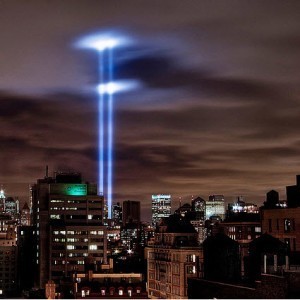
Ground Zero image by A. Strachey (Flickr/Q2)
"9/11 reminded me just how powerful music can be … how it can provide answers when words are not enough … how it can unite us with a mystical thread that knows no boundaries."
—Midge Woolsey, WQXR, on hosting a live program in New York on the night of 9/11 in The Mystical Power of Music
As we save up good reads and listens for the weekend, none of us is unaware of the tenth anniversary of the September 11 attacks. I'd like to commend to you The Requiem Project on Q2 —a still-young 24/7 online-streaming NPR affiliate from WNYC/WQXR. Q2 specializes in cultivating the work and voices of our most eloquent professional contemporary composers.
The Requiem Project, hashtagged #Q2R, is the focus of the stream from Friday through Sunday. The weekend includes an unprecedented live webcast from the Temple of Dendur, Sunday at 3:30 p.m. ET, at the Metropolitan Museum of Art. Full info is on the site, but you need know nothing about the composers or musicians in order to engage in some of the most opulent vocabularies of our era. Producer Alex Ambrose is marshaling what he calls "an almost pointillistic array of voices that address mourning and consolation" all weekend.
It will be there when you need it.
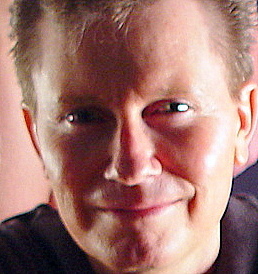 Porter Anderson is a Fellow with the National Critics Institute, and a senior producer and consultant formerly with the United Nations World Food Programme in Rome and INDEX: Design to Improve Life in Copenhagen. As a journalist, he has worked with media including CNN, the Village Voice, and the Dallas Times Herald. He's based in Tampa.
Porter Anderson is a Fellow with the National Critics Institute, and a senior producer and consultant formerly with the United Nations World Food Programme in Rome and INDEX: Design to Improve Life in Copenhagen. As a journalist, he has worked with media including CNN, the Village Voice, and the Dallas Times Herald. He's based in Tampa.

September 7, 2011
Has Rejection Turned You Into Someone You're Not?
"Don't allow your wounds to transform you into someone you are not." —Paulo Coelho
It doesn't happen often, but every once in a while, I hear a story (second hand) about writers who have been wounded by my feedback. These stories reach me many years after the feedback has been given.
Every single time, while I usually remember the writer in question, I have forgotten what I said, or what the project was about.
I often like to advise writers: Don't take rejection personally. When you seek commercial publication, you have to switch mindsets. You have to see your writing as a product. You're entering into a business transaction.
Of course, that's very easy for me to say. I'm not the one being rejected. That said, I've had my share of professional, business-based rejection, too. It gets easier the more you experience it. And when you work on the inside of a publishing house, and you see how decisions get made day to day, you realize there's nothing about it that any author ought to take seriously.
I wish I could tell those writers, the ones who carry wounds from words I uttered years ago, that what I said was not meant to be taken seriously. It was said as part of my business day, and sometimes I forget there could be a person allowing my words to carry a weight they shouldn't have.
If you're carrying around a rejection burden, I hope you'll reflect on whether or not the person who rejected you is still thinking about it, or could even recall the rejection. If they're not likely to be carrying a burden, then why do you keep it around for yourself?
For additional inspiration: multiple versions of Two Monks Carry a Woman

September 5, 2011
When Writing Doesn't Pay the Bills
In celebration of Labor Day, Open Road Media has produced a video that features writers talking about the jobs they held before becoming full-time writers.
You'll hear about selling blood, working for the railroads, and getting fired from a movie theatre. Writers featured include: Lawrence Block, John Lutz, Andre Dubus III (speaking about his father), Mary Glickman, Don Winslow, Kevin O'Brien, and M. William Phelps. [Video is 2 minutes.]

September 4, 2011
7 Reasons to Tell a Story in 2011
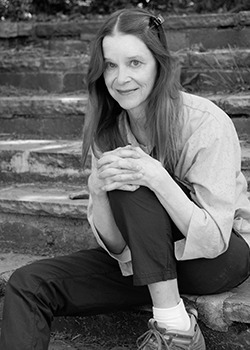
Melanie Rae Thon (photo by Andi Olsen)
In the latest Glimmer Train bulletin, there's an amazing piece by Melanie Rae Thon, "The Heart Breaks, and Breaks Open: Seven Reasons to Tell a Story in 2011." Here's a small snippet:
… [E]very time you remember an episode of your life, you are reinventing it: embellishing, deleting, altering it through fusion and imagination.
If you cannot imagine, you cannot remember.
There is no such thing as "I."
Re-membering is transformation!
Every person on this earth is a storyteller.
Click here to read the full piece.
Click here to read the entire Glimmer Train bulletin.

September 3, 2011
Listen to 20 Minutes of My Advice for Authors
I was recently interviewed on the StoryWonk podcast, with author Lani Diane Rich and Alastair Stephens. It's a 20-minute discussion about publishing, new media, social media, and miscellaneous Jane-fu. Click here to listen.

September 2, 2011
Telling Important Stories Through Apps, Not Books
In the past ten years, the very nature of storytelling has changed so much, I don't really know what to call myself.
I'm an author, a filmmaker, and a photographer.
The one thing I know for sure, I have a story about the 9/11 Memorial that is different from anything else—and it began ten years ago.
After 9/11 I made a film. It was called 7 Days In September and it got good reviews.
In making that film, I ended up as the curator of the world's largest single collection of 9/11 video.
Flash forward. I've been at the WTC site for the past five years. I've been there when it was an empty pit. I've been there when it was a steel skeleton. And I've become the defacto documentary filmmaker for the Memorial Foundation, with remarkable access to the story of the design, creation, curation, and construction of both the Memorial and Museum.
Along the way, my film career expanded to photography and writing. I'm a photographer with Getty Images and a published author with McGraw Hill (Curation Nation).
So, foolishly I thought that a triple-threat would be catnip for book publishers looking to have editorial projects that spanned media on a topic that clearly was going to be topical, and then evergreen.
Wrongo.
Book publishers first said, "You're making a photobook." The subtext: "We hate photobooks." They are expensive, hard to market, and only sell as Christmas gifts. So my photos were a liability.
I thought that having video that tied back to the text could help with an enhanced e-book, but here too publishers seemed to think that they were in the "word" business and all this other stuff was just for marketing or a distraction.
The challenge of the topic of 9/11 is that the reader brings different needs, and fears, to the topic.
For some readers, the history and the future of the site are powerful. The day of 9/11 is just too painful. For others, who are too young to remember the day, those stories and images are essential.
Simply put, it's a story that needs multiple entry points and multiple exits. For an author used to taking readers by the hand, that is no easy transition—but one that is both interesting and very much where the future of the book is headed.
So rather than create a linear experience—a film or book with a beginning, middle and end—I decided to create a journey.
The app was submitted to Apple on August 4 and approved on August 8, which my developer friends tell me is unheard of.
But, marketing an app isn't easy. And Apple adds a few bumps in the road. You can only send out 50 pre-release preview codes before the launch date.
And finding a way to reach iPad owners without being featured by Apple is a trick too.
So, after much soul searching, I priced the app at FREE. The plan is to get it in as many hands as possible from September 1 to September 11. Afterward, it will be priced at $9.95. (Click here to visit the app's site.)
I'm not sure how that will work out, if either the book trade media or other media will engage, and how readers will feel about the material or the format.
But it's an adventure and a topic that I'm going to follow until the Museum opens in 2012.
Then I'll write a book! :)
Steve Rosenbaum is an American television producer and filmmaker best known as the creator of MTV News UNfiltered. He is the author of Curation Nation, published by McGrawHill Business (2011). He is the founder of Magnify.net, where people can integrate user-generated video, video that they produce, or video that they discover into a website with social networking features.
Note from Jane: I've invited Steve to report back on his journey, right here on this blog, in 2012.
Jane Friedman
- Jane Friedman's profile
- 1882 followers


